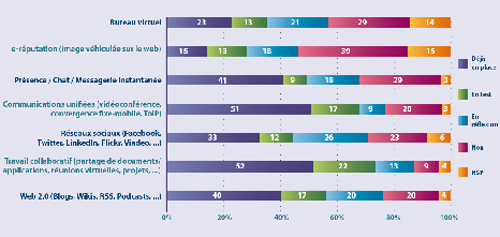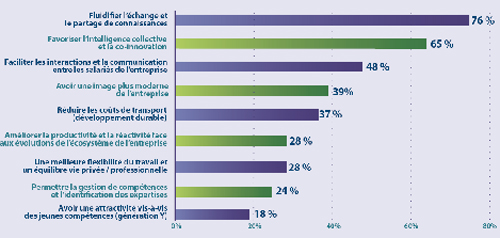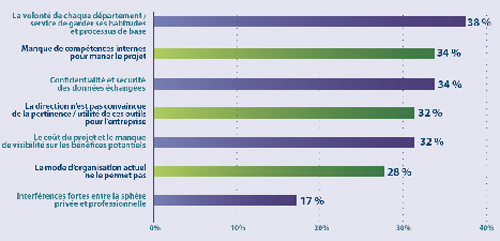A lire sur: http://www.technologyreview.com/communications/40233/?nlid=nlcomm&nld=2012-04-30
Siri may not be the smartest AI in the world, but it's the most socially adept.
Things Reviewed:Siri (beta release, running on iPhone 4)
START http://start.csail.mit.edu
The Man Who Lied
to His Laptop: What Machines Teach Us about Human Relationships Clifford Nass
Current, 2010
Me:
"Should I go to bed, Siri?"
Siri:
"I think you should sleep on it."
It's hard not to admire a smart-aleck reply like that. Siri—the
"intelligent personal assistant" built into Apple's iPhone 4S—often
displays this kind of attitude, especially when asked a question that
pokes fun at its artificial intelligence. But the answer is not some
snarky programmers' joke. It's a crucial part of why Siri works so well.
The popularity of Siri shows that a digital assistant needs more
than just intelligence to succeed; it also needs tact, charm, and
surprisingly, wit. Errors cause frustration and annoyance with any
computer interface. The risk is amplified dramatically with one that
poses as a conversational personal assistant, a fact that has undone
some socially stunted virtual assistants in the past. So for Siri, being
likable and occasionally kooky may be just as important as dazzling
with feats of machine intelligence.
Siri has its origins in a research project begun in 2003 and
funded by the U.S. military's Defense Advanced Research Projects Agency
(DARPA). The effort was led by SRI International, which in 2007 spun off
a company that released the original version of Siri as an iPhone app
in February 2010 (the technology
was named among
Technology Review's
10 Emerging Technologies in 2009). This earlier Siri could do fewer
things than the one that later came built into the iPhone 4S. It was
able to access a handful of online services for making restaurant
reservations, buying movie tickets, and booking taxis, but it was
error-prone and never made a big hit with users. Apple bought the
startup behind Siri for an undisclosed sum just two months after the app
made its debut.
The Siri that appeared a year and a half later works astonishingly
well. It listens to spoken commands (in English, French, German, and
Japanese) and responds with either an appropriate action or an answer
spoken in a calm, suitably robotic female voice. Ask Siri to wake you up
at 8:00 a.m. and it will set the phone's alarm clock accordingly. Tell
Siri to send a text message to a friend and it will dutifully take
dictation before firing off your missive. Say "Where can I find a
burrito, Siri?" and Siri will serve up a list of well-reviewed nearby
Mexican restaurants, found by querying the phone's location sensor and
performing a Web and map search. Siri also has countless facts and
figures at its fingertips, thanks to the online "answer engine" Wolfram
Alpha, which has access to many databases. Ask "What's the radius of
Jupiter?" and Siri will casually inform you that it's 42,982 miles.
Siri's charismatic quality is entirely lacking in other
natural-language interfaces. Several companies sell virtual customer
service agents capable of chatting with customers online in typed text.
One example is Eva, created by the Spanish company Indysis. Eva can chat
comfortably unless the conversation begins to stray from the areas it's
been trained to talk about. If it does, then Eva will rather rudely
attempt to push you back toward those topics.
Siri also has some closer competitors in the form of apps
available for iPhones and Android devices. Evi, made by True Knowledge;
Dragon Go, from the voice-recognition company Nuance; and Iris, made by
the Indian software company Dexetra, are all variations on the theme of
a voice-controlled personal assistant, and they can often match Siri's
ability to understand and carry out simple tasks, or to retrieve
information. But they are much less socially adept. When I asked Iris if
it thought I should go to sleep, "Perhaps you could use the rest" was
its flat, humorless response.
Impressive though Siri is, however, the AI involved is not all
that sophisticated. Boris Katz, a principal research scientist at MIT's
Computer Science and Artificial Intelligence Lab, who's been building
machines that parse human language for decades, suspects that Siri
doesn't put much effort into analyzing what a person is asking. Instead
of figuring out how the words in a sentence work together to convey
meaning, he believes, Siri often just recognizes a few keywords and
matches them with a limited number of preprogrammed responses. "They
taught it a few things, and the system expects those things," he says.
"They're very clever about what people normally ask."
In contrast, conventional artificial-intelligence research has
strived to parse more complex meaning in conversations. In 1985, Katz
began building a system called START to answer questions by processing
sentence structure. That system answers typed questions by analyzing how
the words are arranged, to interpret the meaning of what's being asked.
This enables START to answer questions phrased in complex ways or with
some degree of ambiguity.
In 2006—a year before SRI spun off its startup—Katz and colleagues
demonstrated a software assistant based on START that could be accessed
by typing queries into a mobile phone. The concept is remarkably
similar to Siri, but this part of the START project never progressed any
further. It remained less important than Katz's pursuit of his real
objective—to create a machine that can better match the human ability to
use language.
To understand how difficult it is
to get communication right, you need look no further than the infamous
intelligent assistant Clippy, introduced by Microsoft in 1997.
START is just a tiny offshoot of the research into artificial
intelligence that began some 50 years earlier as an attempt to
understand the functioning of the human mind and to create something
analogous in machines. That effort has produced many truly remarkable
technologies, capable of performing computational tasks that are
impossibly complicated for humans. But artificial-intelligence research
has failed to re-create many aspects of human intellect, including
language and communication. As Katz explains, a simple conversation
between two people can tap into the full depth of a person's life
experiences, and this remains impossible to mimic in a machine. So even
as AI systems have become better at accessing, processing, and
presenting information, human communication has continued to elude them.
Despite being less capable than START at dealing with the
complexities of language, Siri shows that a machine can pull off just
enough tricks to fool users into feeling as if they're having something
approximately like a real conversation. To understand how difficult it
is to get even simple text-based communication right, you need look no
further than the infamous intelligent assistant introduced by Microsoft
back in 1997. This annoying virtual paper clip, called Clippy, would pop
up whenever a user created a document, offering assistance with a
message such as the infuriating line "It looks like you're writing a
letter. Would you like help?" Microsoft expected users to love Clippy.
Bill Gates thought fans would design Clippy T-shirts, mugs, and
websites. So the company was stunned, and confused, when users hated
Clippy, creating T-shirts, mugs, and websites dedicated to disparaging
it. The response was so bad that Microsoft killed Clippy off in 2007.
Before it did, Microsoft hired Stanford professor Clifford Nass,
an expert on human-computer interaction, to investigate why the program
had inspired so much unpleasantness. Nass, who is the author of
The Man Who Lied to His Laptop: What Machines Teach Us about Human Relationships, has
spent years studying similar phenomena, and his work suggests a fairly
simple cause: people instinctively apply the rules of human social
interactions to dealings with computers, cell phones, robots, in-car
navigation systems, and similar machines. Nass realized that Clippy
broke just about every norm of acceptable social behavior. It made the
same mistakes again and again, and constantly pestered users who wanted
to be left alone. "Clippy's problem was it said 'I'll do everything' and
then proceeded to disappoint," says Nass. Just as a person who repeats
the same answer again and again makes us feel insulted, Nass says, so
does a computer interface—even if we know full well we're dealing with a
machine.
Clippy showed that attempting more humanlike communication can
backfire spectacularly if the subtleties of social behavior aren't
understood and respected. Nass says Apple did everything possible to
make Siri likable. Siri doesn't impose itself on the user at all. The
application runs in the background on the iPhone, leaping to attention
only when the user holds down the "home" button or puts the phone to his
or her ear and starts speaking. It also avoids making the same mistake
twice, trying different answers when the user repeats a question. Even
the tone of Siri's voice was carefully chosen to be inoffensive, Nass
believes.
Apple also limited the tasks Siri can perform and the answers it
can give, most probably to avoid disappointment. If you ask Siri to post
something to Twitter, for example, it'll sheepishly admit that it
doesn't know how. But since the alternative could be accidentally
broadcasting garbled tweets, this strategy is understandable.
The accuracy of Siri's voice recognition also helps avoid
disappointment. The system does sometimes mishear words, often with
amusing results. "I'm sorry, Will, I don't understand 'I need pajamas'"
was a curious response to a question that had nothing to do with
pajamas. But mostly the voice system works remarkably well. It has no
problem with my English accent or with many complex words and phrases,
and this overall accuracy makes the odd mistake that much more
acceptable.
A key challenge for Apple was that soon after meeting Siri, a
person may experience a powerful urge to trip up this virtual
know-it-all: to ask it the meaning of life, whether it believes in God,
or whether it knows R2D2. Apple chose to handle this phenomenon in an
inventive way: by making sure Siri gets the joke and plays along. Thus
it has a clever answer for just about any curveball thrown at it and
even varies its responses, a trick that makes it seem eerily human at
times.
This banter also helps lessen the blow when Siri misunderstands
something or is stumped by a surprisingly simple question. Once, when I
asked who won the Super Bowl, it proudly converted one Korean won into
dollars for me. I knew this was just an algorithmic error in a distant
bank of computer servers, but I also felt the urge to interpret it as
Siri being zany.
Nass says the way Siri handles humor is inspired. Research has
revealed, he notes, that humor makes people seem smarter and more
likable. "Intermittent, innocent humor has been shown, for both people
and computers, to be effective," Nass says. "It's very positive, even
for the most boring, staid computer interface."
But Katz, as someone who has been striving for decades to give
machines the ability to use language, hopes eventually to see something
much more sophisticated than Siri emerge: a machine capable of holding
real conversations with people. Such machines could provide fundamental
insights into the nature of human intelligence, he says, and they might
provide a more natural way to teach machines how to be smarter.
That might continue to be the dream of AI researchers. For the
rest of us, though, the arrival of a virtual assistant that is actually
useful is just as fundamental a breakthrough. In Katz's office at MIT, I
showed him some of the amusing answers Siri comes up with when
provoked. He chuckled and remarked at the cleverness of the engineers
who designed Siri, but he also spoke as an AI researcher using meanings
and words that Siri would undoubtedly struggle with. "There's nothing
wrong with having gimmicks," he said, "but it would be nice if it could
actually analyze deeply what you said. The conversations with the user
will be that much richer."
Katz is right that a more revolutionary intelligent personal
assistant—one that's capable of performing many more complicated
tasks—will need more advanced AI. But this also underplays an important
innovation behind Siri. After testing the app a while longer, Katz
confessed that he admires entrepreneurs who know how to turn advances in
computer science into something that ordinary people will use every
day. "I wish I knew how people do that," he admits.
For the answer, perhaps he just needs to keep talking to Siri.
Will Knight is Technology Review
's online editor.






 En
ce contexte tendu, toutes les économies sont bonnes à prendre. Surtout
si elles contribuent à réduire les temps de cycle et fiabiliser les
processus. Les flux d’informations dans les interactions entre les
entreprises sont un gisement insuffisamment exploité à cause d’aprioris
de coût, de complexité ou de maturité. Pourtant, leur dématérialisation
ouvre de réelles perspectives, à condition de penser autrement qu’en
termes de fichiers transmis par e-mail ou d’extranets.
En
ce contexte tendu, toutes les économies sont bonnes à prendre. Surtout
si elles contribuent à réduire les temps de cycle et fiabiliser les
processus. Les flux d’informations dans les interactions entre les
entreprises sont un gisement insuffisamment exploité à cause d’aprioris
de coût, de complexité ou de maturité. Pourtant, leur dématérialisation
ouvre de réelles perspectives, à condition de penser autrement qu’en
termes de fichiers transmis par e-mail ou d’extranets. La
fidélisation de la clientèle des banques est toujours problématique et
ce même si la situation s'est légèrement améliorée. L'indice CEI* (Customer Experience Index) de la neuvième édition du « World Retail Banking Report », publiée par Capgemini et l'Efma (European Financial Marketing Association),
révèle que 9 % des clients sont susceptibles de quitter leur
établissement financier au cours des six prochains mois et 40 % ne sont
pas sûrs de rester fidèles à leur banque à long terme. Au-delà d'une
nécessaire optimisation de l'expérience client, le rapport révèle
également que le potentiel des services bancaires mobiles n'a pas encore
été pleinement exploité.
La
fidélisation de la clientèle des banques est toujours problématique et
ce même si la situation s'est légèrement améliorée. L'indice CEI* (Customer Experience Index) de la neuvième édition du « World Retail Banking Report », publiée par Capgemini et l'Efma (European Financial Marketing Association),
révèle que 9 % des clients sont susceptibles de quitter leur
établissement financier au cours des six prochains mois et 40 % ne sont
pas sûrs de rester fidèles à leur banque à long terme. Au-delà d'une
nécessaire optimisation de l'expérience client, le rapport révèle
également que le potentiel des services bancaires mobiles n'a pas encore
été pleinement exploité.
 Google annonce le lancement officiel de Google Drive, son service de stockage en ligne grand public. " Ces derniers temps, vous avez dû entendre des rumeurs sur Google Drive, un peu comme la chimère du monstre du Loch Ness, explique Sundar Pichai, SVP, Chrome & Apps.
Aujourd’hui, l’une de ces deux rumeurs est devenue réalité. Nous
lançons aujourd’hui Google Drive, votre espace pour créer, partager,
collaborer et conserver tous vos documents. Travailler avec un ami sur
un projet de recherche, préparer votre mariage avec votre moitié, suivre
l'état de vos comptes avec vos colocataires : tout cela est possible
dans Drive. Vous pouvez télécharger et accéder à tous vos fichiers, des
vidéos aux PDF, en passant par vos photos et Google Documents ".
Google annonce le lancement officiel de Google Drive, son service de stockage en ligne grand public. " Ces derniers temps, vous avez dû entendre des rumeurs sur Google Drive, un peu comme la chimère du monstre du Loch Ness, explique Sundar Pichai, SVP, Chrome & Apps.
Aujourd’hui, l’une de ces deux rumeurs est devenue réalité. Nous
lançons aujourd’hui Google Drive, votre espace pour créer, partager,
collaborer et conserver tous vos documents. Travailler avec un ami sur
un projet de recherche, préparer votre mariage avec votre moitié, suivre
l'état de vos comptes avec vos colocataires : tout cela est possible
dans Drive. Vous pouvez télécharger et accéder à tous vos fichiers, des
vidéos aux PDF, en passant par vos photos et Google Documents ".

 Comment
sont perçus et utilisés les outils 2.0 en entreprise ? En veille sur
les tendances et les besoins émergeants des entreprises,
Aastra, spécialiste des communications d’entreprise, publie les
résultats d'une étude réalisée en partenariat avec NotezIT. Cette
enquête a été menée auprès des cadres dirigeants d’un large panel
d’entreprises françaises de tous secteurs et toutes tailles confondus.
Son objectif : évaluer comment les entreprises et leurs collaborateurs
se situent face à ces nouveaux modes de communications (impact sur la
compétitivité, sur l’équilibre vie personnelle/vie professionnelle,
freins éventuels rencontrés, etc.).
Comment
sont perçus et utilisés les outils 2.0 en entreprise ? En veille sur
les tendances et les besoins émergeants des entreprises,
Aastra, spécialiste des communications d’entreprise, publie les
résultats d'une étude réalisée en partenariat avec NotezIT. Cette
enquête a été menée auprès des cadres dirigeants d’un large panel
d’entreprises françaises de tous secteurs et toutes tailles confondus.
Son objectif : évaluer comment les entreprises et leurs collaborateurs
se situent face à ces nouveaux modes de communications (impact sur la
compétitivité, sur l’équilibre vie personnelle/vie professionnelle,
freins éventuels rencontrés, etc.).


 La
vocation structurante des stratégies informatiques ne conduit-elle pas à
l'immobilisme, au manque de créativité et à l'absence de réactivité?
Ou, "peut-on donner de l'agilité à l'alignement stratégique, qui a pour
vocation à structurer lourdement une politique informatique ?". Au-delà
des solutions classiques qui touchent aux moyens et aux hommes, des
nouvelles offres logicielles apparaissent désormais sur le marché, et il
est certain que c'est à partir de ces solutions, de type Smart
Computing, que les directeurs des services Informatiques se
transformeront plus encore plus en directeur des systèmes d'information.
La
vocation structurante des stratégies informatiques ne conduit-elle pas à
l'immobilisme, au manque de créativité et à l'absence de réactivité?
Ou, "peut-on donner de l'agilité à l'alignement stratégique, qui a pour
vocation à structurer lourdement une politique informatique ?". Au-delà
des solutions classiques qui touchent aux moyens et aux hommes, des
nouvelles offres logicielles apparaissent désormais sur le marché, et il
est certain que c'est à partir de ces solutions, de type Smart
Computing, que les directeurs des services Informatiques se
transformeront plus encore plus en directeur des systèmes d'information. Certaines
tendances du cloud vont s'accélérer, changer ou atteindre un tournant
au cours des trois prochaines années. Il est essentiel de surveiller
continuellement les tendances du cloud computing et de mettre
régulièrement à jour la stratégie cloud de l'entreprise afin d'éviter de
coûteuses erreurs ou de manquer les opportunités du marché.
Certaines
tendances du cloud vont s'accélérer, changer ou atteindre un tournant
au cours des trois prochaines années. Il est essentiel de surveiller
continuellement les tendances du cloud computing et de mettre
régulièrement à jour la stratégie cloud de l'entreprise afin d'éviter de
coûteuses erreurs ou de manquer les opportunités du marché.